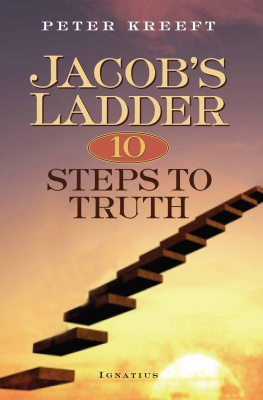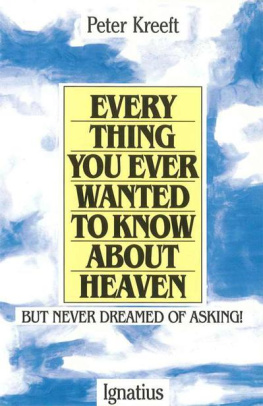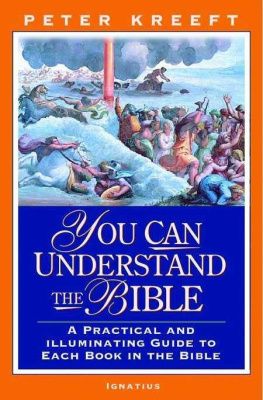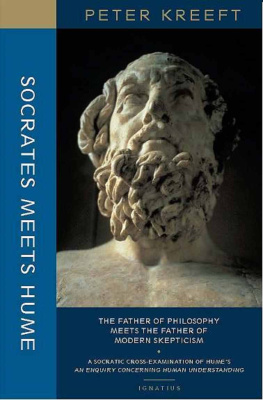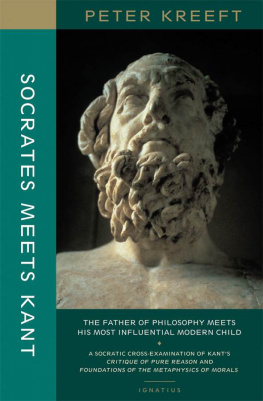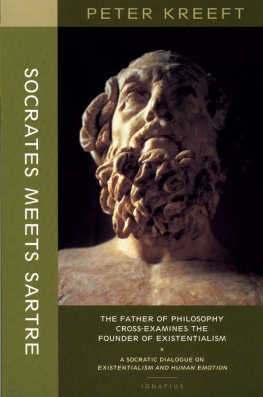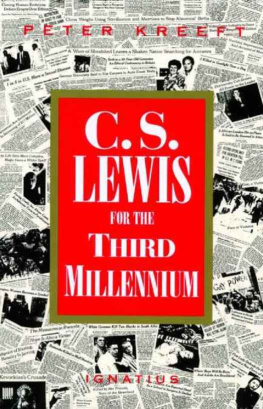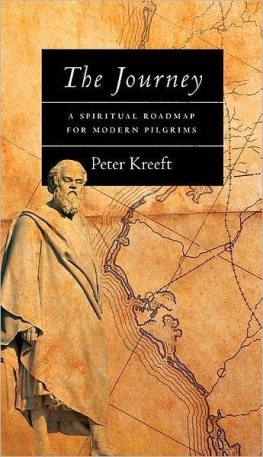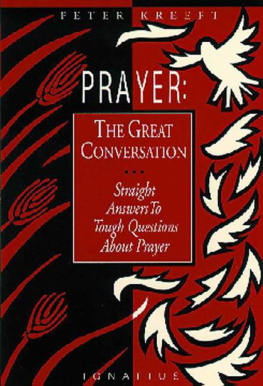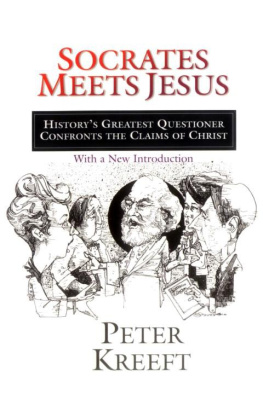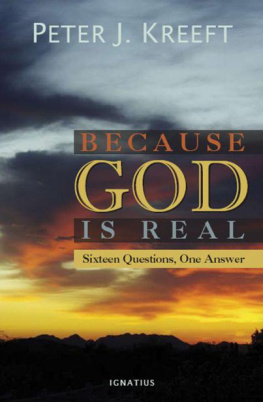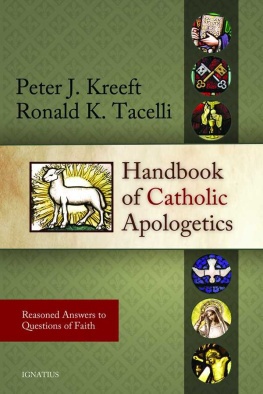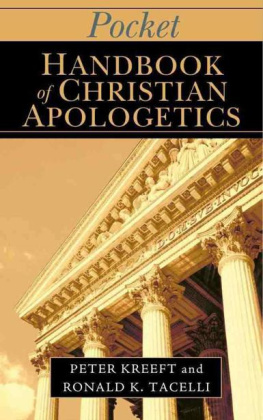JACOBS LADDER
PETER KREEFT
JACOBS LADDER
Ten Steps to Truth
IGNATIUS PRESS SAN FRANCISCO
Cover painting by Stephen Dudro
Cover design by Riz Boncan Marsella
2013 by Ignatius Press, San Francisco
All rights reserved
ISBN 978-1-58617-732-4
Library of Congress Control Number 2012942804
Printed in the United States of America
CONTENTS
INTRODUCTION
As a Catholic and an author of some seventy books, I am often asked by journalists for the Catholic perspective on this or that. But there is no such thing as the Catholic perspectivenot because Catholicism is too soft and flexible to have a single perspective but because it is too hard and dogmatic to be a perspective. There is the masculine perspective and the feminine perspective, the conservative perspective and the liberal perspective, but there is no such thing as the Catholic perspective. Catholicism is not a perspective. It is the truth, the facts, the divinely Authorized data .
Why any honest, logical, and intelligent person in the twenty-first century would believe such an unfashionable dogmawhy they could believe there was any such thing as dogmathat is the question the journalist should be asking, for that is the question behind the question, the story behind the story. This book is about that question.
It is really ten questions. The ten are in a logical order, and the answer to each one is a matter of logic, of reason, not faith. This book is addressed to an intelligent, open-minded Martian. Would that New York Times journalists were open-minded Martians!
Because questions are best answered by dialogue, by comparing two sides of the question, I have written ten dialogues about the ten most basic questions you can ask.
Because a dialogue is not just two points of view or two philosophies but a conversation between two different people, I give you here not only two philosophies but two persons. They are both fictional. They are taken from my fictional non-novel An Ocean Full of Angels (Saint Augustines Press, 2010). The last time I used two of the characters from this fiction, in A Refutation of Moral Relativism , half the readers thought they were real, not fictional. I apologize for the confusion, and I thank you for the compliment.
Dialogue One
PASSION
It was 1977. Libby Rawls had just resigned from the Department of Social Services, and for the first time in her adult life she had nothing to do but enjoy the beach for the rest of the summer. She smiled at the little waves that were lapping happily at the wet, chocolate-colored sand and making music with the tiny stones by rattling them together. She smiled at the sun sparkling on the waters wrinkles. It was a perfect August day at Nahant Beach, just north of Boston.
Libby was only twenty-three, but she had already entered and exited freelance journalism and detective work, as well as social services. She was now burnt out and cynical, after repeatedly butting heads with bureaucracy at the Massachusetts Department of Social Services.
Strange people had often fallen into her unpredictable life, and Mother was only the latest one. Libby never discovered how or why she received that name, but no one ever thought to call her anything else. Libby thought of her as a universal woman, not only because of her mixed race (she was part Jewish, part Hawaiian-Polynesian, and part African) but because her size and shape reminded her of the whole planet. Like a limousine, she occupied two ordinary parking spaces. Her six-foot chassis weighed well over three hundred pounds, but it was all muscle and no flab. This was modestly covered by a bathing suit, which itself was covered by immodestly bright yellow, green, red, and blue figures of toucans.
As Libby arrived at the beach, she was drawn, like a moon, to this planetary body, which was sitting in an oversized beach chair on a bright red blanket. Though the beach was over a mile long, it was crowded today, and much of the crowd was cheering an impromptu waterside performance by two black men, Diddly and Squat, who were putting on the most hilarious and unclassifiable athletic dance performance she had ever seen. Diddly was almost seven feet tall, thin and rubbery, and Squat was half that height but as wide as he was tall; so Diddly was dribbling Squat like a basketball, to the boom-box strains of Spike Jones Mister Lee, and the whole beach, including Mother, was cheering and laughing.
Watching Diddly and Squat, Libby felt a delight that she had missed for many months, and her delight and amazement was squared when the two of them bounced up to Mothers blanket after their performance. Libby discovered that they both lived with Mother at a rooming house on Nahant, and that Diddly was deaf and Squat blind. Hes my eyes, and Im his ears, Squat said.
Libby resolved to get to know these two unpredictable creatures better, but today they were rushing off for a gig that evening. The scraps of information Mother told Libby about herself, about Diddly and Squat, and about the other boarders in her house on Nahant tasted like appetizers to Libby, and she immediately accepted Mothers invitation to visit The House soon.
Libby noticed that Mother was reading a book with the words Catholic and sex in the title. Whats that book about? Libby asked.
Do you really want to know, or are you just making polite conversation? Mother asked, bluntly. As Libby increasingly discovered, Mother was refreshingly (or was it uncomfortably?) blunt.
Since you asked the honest question, Ill give you the honest answer, Libby replied. I really dont know.
Mother looked up with a smile of surprise. Honesty. Thats my best friend, I think. I like you, girl. I suspect you know some things about the rules of thinking.
What do you mean, the rules of thinking?
I think you know you cant just plunge into something like that, any more than you can just plunge into the sea whenever you want. You have to do all sorts of things first.
What things?
Well, you have to get there first. You know. Plan the trip. Get the money. Wait for summer. Change your clothes. Get in the car. Gas it up. Drive to the beach. Park the car. Put on the sunscreen. Go where the water is. Only then can you plunge in.
You mean it takes that kind of preparation to understand that book?
Yup.
Must be an unusual book.
Nope. A lot of good books are that way. Like a ladder. You get the view only from the top, but to get to the top you have to climb up the rungs, one at a time.
So whats the first rung?
You really want to know?
Sure.
Now?
Why not?
So youre not just making polite conversation?
No.
Well, good for you, girl. You put your foot on the first rung right there.
What do you mean? What first rung?
Do you have a passion to know? Thats the first rung.
A passion ? It has to be a passion? It cant just be an interest ?
No. An interestwhats that, anyway? Sounds to me like a euphemism for just making polite conversation.
But a passionthat sounds a little... well, fanatical.
Oooh! You said the F-word!
Libby laughed. Fundamentalist is my F-word.
And that means pretty much the same thing to you, right?
Right. But not to you?
Oh, Im not into the Fs. Im into the Ps. Passion. Thats what Im talking about.
Passion. That sounds sexy.
It is, in a way. But Im talking about the passion for truth.
Okay, even though it doesnt sound as thrilling as sex.
Oh, but sometimes it is. That can be a kind of quasi-sexual thrill too, you know, when truth enters your minds body.
Your minds body? Isnt that a confusion of categories?
Not if we listen to our language. We use the same word for it when it happens to the mind as when it happens to the body.
Next page
